Photographs: Desmond Boylan/Reuters
After a long time, a meaningful campaign to create social awareness for Indian children's right to education was launched by the UNICEF on Monday. Awaaz Do, the project, is timely, direct and uncomplicated, notes Sheela Bhatt.
The campaign came about because the Union government passed the Right of Children to Free and Compulsory Education Act 2009 recently. For the first time in India's history, children will be guaranteed their right to quality elementary education by the State with the help of families and communities.
All children between the ages of six and 14 shall have the right to free and compulsory elementary education at a neighbourhood school. The RTE act is the first legislation in the world that puts the responsibility of ensuring enrolment, attendance and completion on the government.
Unicef is thinking about how to maximise the advantage of having a trend-setting legislation that many developing countries can't even afford. The campaign is to speak in support of the eight million Indian children, aged six to 14 years, who are out-of-school.
Unicef wants to spread the awareness that these children must be sent to school by fellow Indians who are educated, well-off and belong to the 'middle class' and 'upper class.'
Unicef, which takes care of children's rights and well-being, wants your vocal support to the Awaaz Do campaign. It's a digital campaign that wants you and your passion for a better India of tomorrow. Just log on to http://www.awaazdo.in for details.
Text: Sheela Bhatt in New Delhi
..
Awaaz Do: Will India rise for 8 mn uneducated children?
Photographs: Mukesh Gupta/Reuters
The RTE act specifies minimum norms in government schools and requires all private schools to reserve 25 per cent of seats for children from poor families (to be reimbursed by the State as part of the public-private partnership plan). The act also provides that no child shall be held back, expelled, or required to pass a board examination until the completion of elementary education.
There is also a provision for special training of school drop-outs to bring them up to par with students of the same age.
There is no direct (school fees) or indirect cost (uniforms, textbooks, mid-day meals, transportation) to be borne by the child or the parents to obtain elementary education. The government will provide schooling free-of-cost until a child's elementary education is completed.
This won't be an easy job because of caste difference, class difference, inefficient governance and lack of funds; but still, educationalists thinks that a beginning has been made and this opportunity must be consolidated before it fades out without results.
The message from the Awaaz Do campaign is that if you have time and if you care, then take one uneducated child to school and make sure he studies. If that's not possible for you, then support the campaign, at least.
In fact, India should find itself lucky to have such a campaign just when Parliament has agreed in principle to provide for funds for education and the future of children.
Many experts have said that urban Indians should realise that without being jingoistic the most constructive thing to do for your country is to educate one uneducated poor child. And, if you can't do that much, have the awareness, feel for the uneducated poor Indian children, and be a part of the pressure group in society.
Unicef says educated citizens could go to www.schoolreportcards.in and find out what all is needed in schools in their areas.
The Fund wants at least five lakh Indians to log in to create a fraternity that thinks that India's best solution lies in educating those eight million children living around us but who are mostly invisible, and who have not seen school at all.
Awaaz Do: Will India rise for 8 mn uneducated children?
Photographs: Parivartan Sharma/Reuters
While launching the digital campaign, Unicef's Dr Karin Hulshof said, "In the last five years there is a huge increase in school-going children in India but it's a challenge to ensure how to keep them going."
Between 2000 and 2005, India increased primary school enrolment overall by 13.7 per cent, and by 19.8 per cent for girls . The number of 'out-of-school' children has declined from 25 million in 2003 to 8.1 million.
The most significant improvements have been in Bihar, Jharkhand, Manipur and Chhattisgarh. The percentage of 'out-of-school children' in highly populated states like Uttar Pradesh, West Bengal, Orissa and Bihar, however, remains a cause of concern.
Dr Halshof said if the Right to Education Act is properly implemented, India would need one million teachers, because the student-to-teachers ratio must not exceed 1:30 under the new law.
Urmila Sarkar, chief of education, Unicef said India has done well in ensuring that 98 per cent of the children are able to access primary schools within a distance of one km, but still lots need to be done in the area of higher education.
Under the new Act, children have the right to have at least one qualified and trained teacher for every 30 pupils. Currently, the national average is about one teacher to every 34 students, but in states such as Jharkhand, Madhya Pradesh and West Bengal, one teacher works with more than 60 students. According to Unicef, currently, about one in five primary school teachers do not have the requisite minimum academic qualification to ensure children's right to quality learning.
Awaaz Do: Will India rise for 8 mn uneducated children?
Photographs: Ajay Verma/Reuters
Unicef has found that 84 out of 100 schools have drinking water facilities overall in India. But nearly half the schools in Arunachal Pradesh, Assam and Meghalaya do not. Sixty-five out of 100 schools have common toilets in India; however, only one out of four schools in Arunachal Pradesh, Assam, Chandigarh, Delhi, Jammu and Kashmir, Jharkhand, Orissa and Rajasthan have this facility.
Fifty-four out of 100 schools have separate toilets for girls. On an average, only one in nine schools in Assam, Meghalaya, Manipur have separate toilets and one in four schools in Bihar, Chhattisgarh, Jammu and Kashmir, Jharkhand and Orissa do.
The Awaaz Do campaign has been launched because experts think that this great momentum for education will fritter away if the pressure is not built on government in states and the Centre.
Unicef's officials in India say that creative and sustained initiatives are crucial to train more than one million new and untrained teachers within the next five years and to reinforce the skills of in-service teachers to ensure child-friendly education.
Awaaz Do: Will India rise for 8 mn uneducated children?
Image: Prime Minister Dr Manmohan Singh with school children in New DelhiPhotographs: Ho New/Reuters
Families and communities also have a large role to play in ensuring child-friendly education for each and every one of the estimated 190 million girls and boys in India who should be in elementary school.
Disparities must be eliminated to assure quality with equity. Investing in preschool is a key strategy in meeting the goals.
It will be a difficult task because the central and state governments will be sharing the financial responsibility for the RTE's implementation. The central government is to prepare estimates of expenditures while the state governments will be provided a percentage of these costs.
Under the act, the central government may request the Finance Commission to consider providing additional resources to a state in order to carry out the RTE's provisions. The state government shall be responsible for providing the remaining funds needed to implement them.
There will be a funding gap, which needs to be supported by partners from civil society, development agencies, corporate organisations and citizens of the country.
No doubt, financing and implementing the act will be an almost impossible task, but Dr Halshof thinks precisely for that reason Unicef wants educated Indians to support the cause. She says, "Unicef's latest campaign is not about money. It's about citizenship."

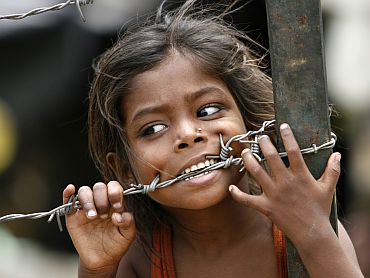
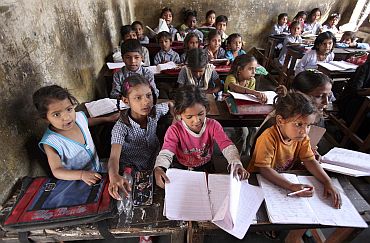
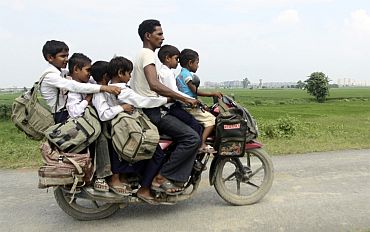
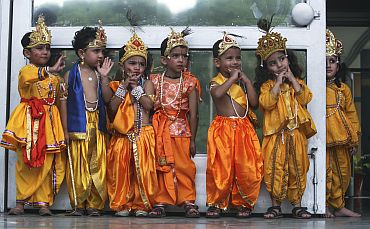
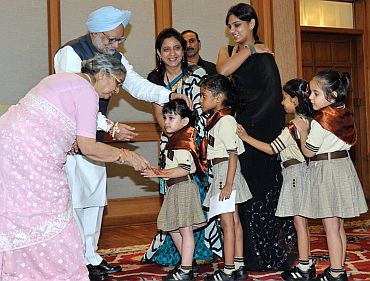
article